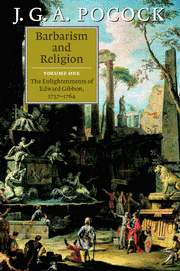Book contents
- Frontmatter
- Contents
- Acknowledgements
- Note on references, quotations and translations
- List of abbreviations
- Introduction
- PART I ENGLAND AND SWITZERLAND, 1737–1763
- 1 Putney, Oxford and the question of English Enlightenment
- 2 Lausanne and the Arminian Enlightenment
- 3 The re-education of young Gibbon: method, unbelief and the turn towards history
- 4 The Hampshire militia and the problems of modernity
- 5 Study in the camp: erudition and the search for a narrative
- PART II THE ENCOUNTER WITH PARIS AND THE DEFENCE OF ERUDITION, 1761–1763
- PART III LAUSANNE AND ROME: THE JOURNEY TOWARDS A SUBJECT, 1763–1764
- Epilogue: Gibbon and the rhythm that was different
- List of references
- Index
4 - The Hampshire militia and the problems of modernity
Published online by Cambridge University Press: 15 December 2009
- Frontmatter
- Contents
- Acknowledgements
- Note on references, quotations and translations
- List of abbreviations
- Introduction
- PART I ENGLAND AND SWITZERLAND, 1737–1763
- 1 Putney, Oxford and the question of English Enlightenment
- 2 Lausanne and the Arminian Enlightenment
- 3 The re-education of young Gibbon: method, unbelief and the turn towards history
- 4 The Hampshire militia and the problems of modernity
- 5 Study in the camp: erudition and the search for a narrative
- PART II THE ENCOUNTER WITH PARIS AND THE DEFENCE OF ERUDITION, 1761–1763
- PART III LAUSANNE AND ROME: THE JOURNEY TOWARDS A SUBJECT, 1763–1764
- Epilogue: Gibbon and the rhythm that was different
- List of references
- Index
Summary
Gibbon left Lausanne and returned to England early in 1758, travelling at some risk in disguise as a Swiss officer in the Dutch army, in order to pass through France at a time of war with England –
the resentment of the French at our taking their ships without a declaration had rendered that polite nation somewhat peevish and diffcult.
He was needed at home; his father had remarried and desired to break the entail, and in good eighteenth-century fashion the son needed to ensure his hopes of the inheritance. Gibbon recognised – at least in recollection – that he needed to leave Lausanne, and separate from Suzanne Curchod, if he was ever to be an Englishman again, and he soon found himself a young country gentleman, dividing his time between the family estate in Buriton, Hampshire – where he worked on the French manuscript of the Essai sur l'etude de la littératuré – and London, where he found English polite culture a little less than congenial. Lady Hervey figures in the Memoirs as the nearest equivalent England had to a salonnière, and there are hints of something less than an affinity with Samuel Johnson's Club which he was to join later. It may also be significant that he tells us of this time that he decided against the profession of the law, partly because black-letter was not his kind of scholarship but also because he lacked the gift of eloquence necessary for success at the bar.
- Type
- Chapter
- Information
- Barbarism and Religion , pp. 94 - 120Publisher: Cambridge University PressPrint publication year: 1999
- 1
- Cited by



